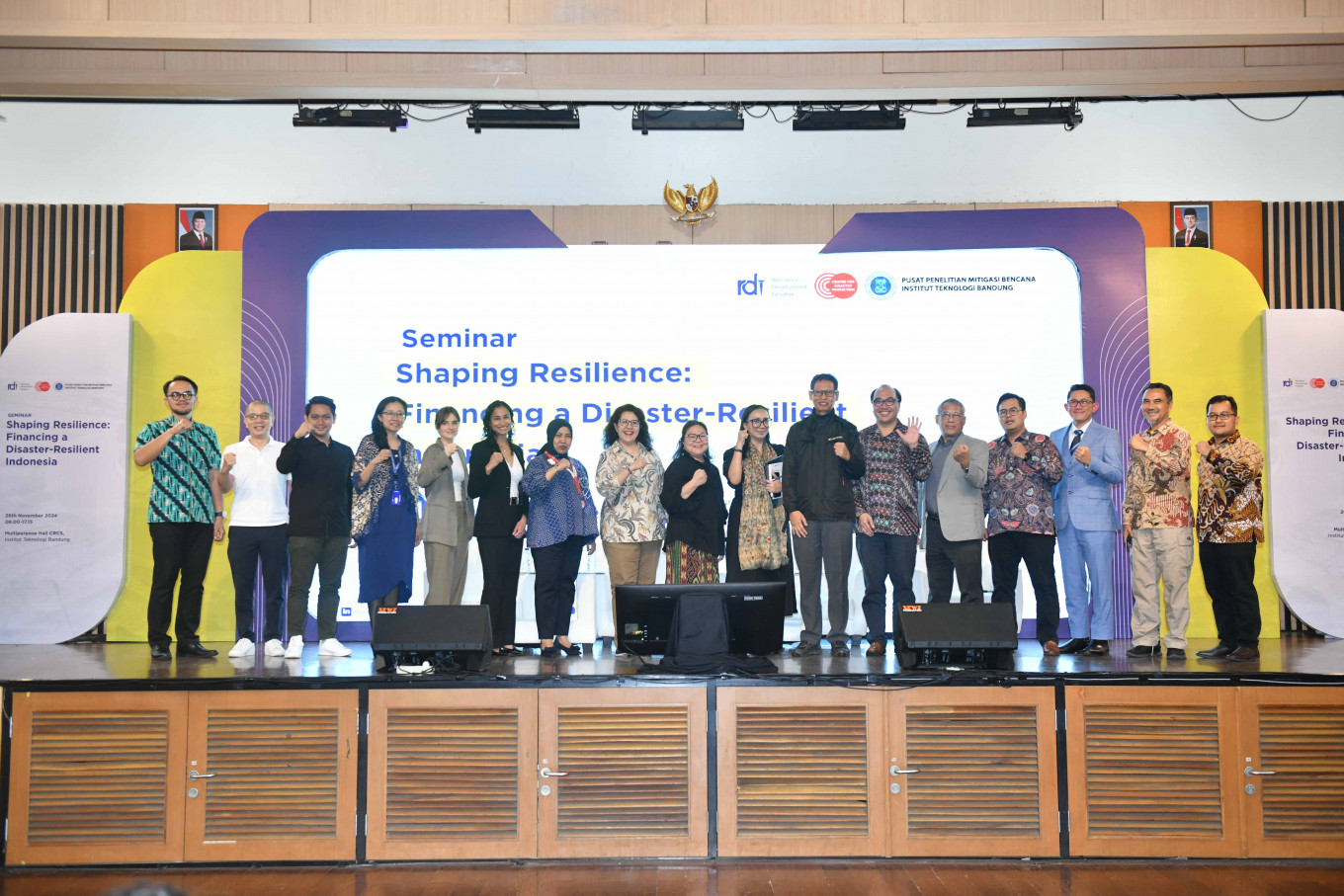Popular Reads
Top Results
Can't find what you're looking for?
View all search resultsPopular Reads
Top Results
Can't find what you're looking for?
View all search resultsDisaster risk financing: Pathways to a resilient Indonesia
Change text size
Gift Premium Articles
to Anyone
T
he seminar titled "Shaping Resilience: Financing a Disaster-Resilient Indonesia" was successfully held through a collaboration between the Centre for Disaster Protection (CDP), Resilience Development Initiative (RDI) and the Disaster Mitigation Research Center of the Bandung Institute of Technology (PPMB ITB). The event centered around disaster risk finance (DRF), a critical global initiative aimed at enhancing financial resilience in the face of disasters. DRF is an evolving concept that integrates a variety of financial tools and strategies to ensure that nations, communities and individuals are better prepared to manage the economic impacts of disasters, from prevention and mitigation to recovery. This global initiative seeks to address the growing financial risks posed by climate change, extreme weather events and other hazards, while also promoting sustainable development.
This concept has gained increasing importance as Indonesia is one of the most disaster-prone countries in the world. Its location along major tectonic plates and extensive coastlines makes it highly vulnerable to frequent earthquakes, tsunamis and extreme weather events. These disasters often trigger floods and landslides, leading to devastating impacts on safety, livelihoods and economic stability. Between 2000 and 2016, Indonesia incurred average annual economic losses of approximately US$1.54 billion, according to Finance Ministry data. These losses are exacerbated by climate change, increasing the frequency and intensity of disasters.
The socio-economic vulnerability of Indonesia's population further complicates disaster management. In 2023, around 25.22 million Indonesians, approximately 9 percent of the population, lived below the poverty line according to Statistics Indonesia (BPS). Many of these individuals rely on natural resources for livelihoods, particularly in the agricultural and informal sectors. Such dependence amplifies vulnerability to disasters, pushing already impoverished communities deeper into poverty and hindering national economic growth.
The framework of DRF, particularly through Indonesia’s Disaster Risk Financing and Insurance (DRFI) strategy introduced in 2018, aims to mitigate the impacts of disasters by integrating risk layering, forming partnerships with private entities for community-focused insurance products and strengthening regulatory frameworks. It also emphasizes public outreach and education to enhance understanding of DRF. Despite these efforts, significant challenges remain. Indonesia's insurance penetration rate is low, especially among low-income communities. Public awareness of DRF is limited, and the complexity of Indonesia's disaster landscape further complicates the situation.
To tackle these challenges, the RDI, in collaboration with the CDP, has been conducting DRF research projects since the beginning of this year. This seminar, as a key outreach initiative, brought together experts and practitioners to share valuable insights and propose actionable strategies for enhancing disaster resilience in Indonesia.
The seminar featured four thematic sessions addressing different aspects of DRF and resilience-building. The first session examined Indonesia’s DRF landscape, focusing on global best practices and addressing funding gaps. Discussions highlighted the integration of risk retention and transfer mechanisms, such as catastrophe bonds and disaster loans. The session was led by Saut Sagala, vice chairman of PPMB ITB and senior research fellow at the RDI, along with Shakira Mustapha, research lead at the CDP.
The second session explored sustainable financing models, including micro-insurance and community-based funding mechanisms. Emphasis was placed on public-private collaboration to address low insurance awareness and accessibility. Speakers included Udrekh, director of risk mapping and evaluation at the BNPB, and Krishna S. Pribadi from PPMB ITB. Discussions underscored the importance of data-driven approaches and community engagement in DRF.
The third session highlighted market-driven strategies to enhance resilience, particularly for small and medium enterprises. Speakers, including Ikatri Meynar Sihombing, microfinance specialist; Hengki Eko Putra, principal research and development at Maipark Re; and Dumaria Rulina Tampubolon, of ITB, discussed the role of microfinance and innovative financial instruments in building resilience. Topics ranged from climate adaptation to risk pooling for small businesses.
The final session focused on the role of adaptive social protection (ASP) systems in enhancing disaster response and recovery efforts. Moderated by Dyah Larasati, social policy expert and senior fellow researcher at RDI, with Daniel Clarke, director of the CDP, and Hasatama Hikmah, junior expert social counsellor at the Social Affairs Ministry as speakers, the discussion provided national and global perspectives on leveraging ASP to improve recovery and long-term socio-economic stability.
The seminar underscored the importance of partnerships between research institutions, government bodies and private stakeholders in driving disaster resilience. The joint efforts of the RDI, CDP and PPMB ITB demonstrated how policy, research and practical implementation can converge to create meaningful change. The discussions emphasized the need to advance DRF frameworks, promote public-private partnerships and empower vulnerable communities with tailored financial tools, such as micro-insurance and ASP.
As Indonesia faces increasing disaster risks and economic vulnerabilities, initiatives like the DRFI strategy by the Finance Ministry are vital for enhancing resilience. The "Shaping Resilience: Financing a Disaster-Resilient Indonesia" seminar served as a critical platform for exchanging knowledge, sharing best practices and fostering collaboration. The insights generated are expected to contribute significantly to Indonesia’s preparedness, recovery and long-term socio-economic stability in the face of disaster risks.










